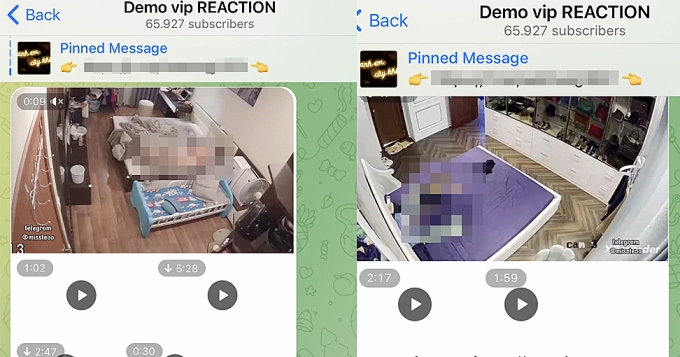Edition: International | Vietnamese
© Copyright 1997 VnExpress.net. All rights reserved.
Minh Hung read the description of a private Telegram group which invited him to join:
"A group specialized in hacking into private cameras of families and shops in Vietnam. All footage is dark corners and hot scenes from families."
Hackers offered Hung three packages for access to the camera footages.
The first cost VND150,000 ($6.18) to allow users to watch over 1,000 videos with random, low-quality images.
The second package, costing VND500,000, would allow users to see high-quality hacked footage, with content updated daily.
The third package, advertised as "super VIP" and costing VND800,000, allows users to watch all the group’s hacked footage from the past four years, along with negotiations regarding family cameras, and access to live camera footage from hundreds of cameras.
"Our software constantly scans localities across the country. Most of the cameras are located in the corners of bedrooms, bathrooms, dressing rooms, toilets, hotels, clothing shops, massage parlors," a group administrator advertised.
 |
|
Screenshots of a private Telegram group advertising bedroom camera footage for sale. |
For the first and second package, Hung will only need to enter the group to watch the videos. But for the third package, he will need to download an application from a camera firm, then use QR codes to watch the live feeds from available cameras.
Hung suspected that it was a scam, but he still spent VND800,000 to try it. When he entered the group, he saw hundreds of obscene comments regarding families' video footage posted online.
Hung then used the application from the camera firm and scanned a QR code provided by the Telegram group's administrator. He then gained access to 15 cameras in the bedrooms, living rooms and dressing rooms of clothing shops and spas. When he selected camera footage from a family’s bedroom, he saw that the timestamps shown on the footage matched the actual time and date.
Hung became worried because his family has cameras installed as well. So, he called his technicians, asking them to help him improve the security of the four cameras he installed at his house. But Hung kept his cameras to watch over his housekeepers that look after his young children.
Unlike Hung, Minh has always opposed the installation of cameras within homes. In his opinion, cameras should only serve to detect intruders and deter them, so they should only be installed outside, or in places like the living room or staircases.
Minh said he once asked his neighbors to point their outdoor security camera in a different direction because it was pointing towards Minh's gate. He was worried that if the neighbors' camera got hacked, bad actors would also know his family's daily schedules and activities.
One cybersecurity official interviewed for this story said that most of the time, camera data got leaked because users set up simple passwords, or even let technicians set up the passwords themselves. In other cases, vulnerabilities exist on the cameras themselves and their accompanying applications.
To ensure security, experts recommend changing passwords regularly, updating software and limiting user access. People should also avoid purchasing "cheap" cameras without clear origins. When people suspect that their cameras have been hacked, due to signs like strange noises, strange movements and being logged out of applications, they need to reset the system and change their passwords promptly.
Lawyer Tran Ngoc Thach, from the Navico law firm, said hacking into cameras, stealing their footage and selling them off without owners' consent is a clear violation of the law. It can result in fines of between VND40-60 million (US$1,650-2,477).
Those who sell illegally-obtained camera footage may also face criminal charges that can result in jail sentences between 1-12 years.